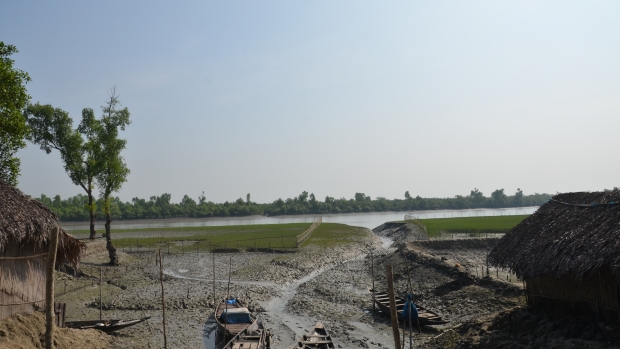Grants :: Medium Grant Facilities :: Road to resilience in Shyamnagar
Road to resilience in Shyamnagar

Small community mangroves are aggregating to a larger lansca ... , Munshiganj, Shyamnagar, Satkhira, Bangladesh © IUCN/Enamul Mazid Khan Siddique, 2014
Objectives
- Community based mangrove rehabilitation and shared governance mechanism strengthened in Shyamnagar;
- Sustainable community-based water management practices for land use diversification are demonstrated in Shyamnagar Upazila.
Background
Shyamnagar is one the most vulnerable coastal subdistricts in Bangladesh, hosting more than 300,000 people - a large portion of which live below the poverty line. These communities are dependent on resources like crab, fish, honey and nypa from the adjacent Sundarbans mangrove forest, which also protects the community from seasonal storms.
Encouraged to protect the forest and the services it provides, visionary representatives of the people of Shyamnagar developed the Citizen's Action Plan for Shonar Shyamnagar 2050 (CAPSS2050).
In line with CAPSS2050, this project has been developed with the aim of mobilising the Shymangar community to establish 20 village forests from 2016-2017. The project also aims to establish 219 village forests by 2030.
Also, in a bid to promote mangrove rehabilitation inside the embankments, and with the support of Mostofa Organic Shrimp Ltd, 5-10 farmers will be trained to practice mangrove aquaculture and to demonstrate the possibilities of making aquaculture business practices more responsible. These are all in line with CAPSS2050 targets.
The project will build the organisational capacity of community groups to sustain the rehabilitated mangroves, and at the same time create opportunities to diversify livelihoods as a means of creating resilience.
Target beneficiaries
The project is expected to benefit approximately 1,500 people directly. These beneficiaries are part of the forest committees who get direct access to fruits and other services provided by the rehabilitated mangroves.
Once the mangroves have grown, they will be expected to protect the embankments and nearby houses from the effects of the seasonal storms, and a rather large area with a population of over 100,000.
Outputs
-
100 hectare mangrove rehabilitated with agreed benefit sharing mechanism and shared governance;
-
About 20 village forest management committees established and functional;
-
Mangrove integrated aquaculture demonstrated in 5 farms.
Accomplishments and challenges
The land on which the mangroves will be rehabilitated are fallow and on public property. The villagers will be organised to protect the area, so an assisted regeneration of the mangroves can be done.
This represents two challenges. Firstly, the land allocation for plantation has to go through the Land Ministry (through the Deputy Commissioner in charge of the district) and Forest Department. This is a complex process. However, Shushilan in favor of the community is maintaining necessary communications with the authorities. In this case the umbrella for Social Forestry will be used to set the rules of benefit sharing from the rehabilitated mangroves.
The second challenge is to integrate the project into existing co-management systems. In some parts, village conservation forums (VCFs) of the co-management committee (CMC) exists, in which case the task will be to get them to take the lead. On the other hand, in the places where no such body prevails, new committees will have to be created and then linked with the co-management system.
Contributions to cross-cutting themes
The project is expected to bring more “voice” to the women of Shyamnagar, especially in decision-making forums for local natural resource management through the village forest committees.
Project Facts
Country
Location
Shyamnagar, Satkhira, Bangladesh
Topic
Duration
1st May 2016 to 31st Oct 2017
MFF Grant Amount
BDT 7,469,800
Implementing Partner
Mustafa Bakuluzzaman, Head of Research, Fund Raising and Public Relations Cell
bakuluzzaman@gmail.com